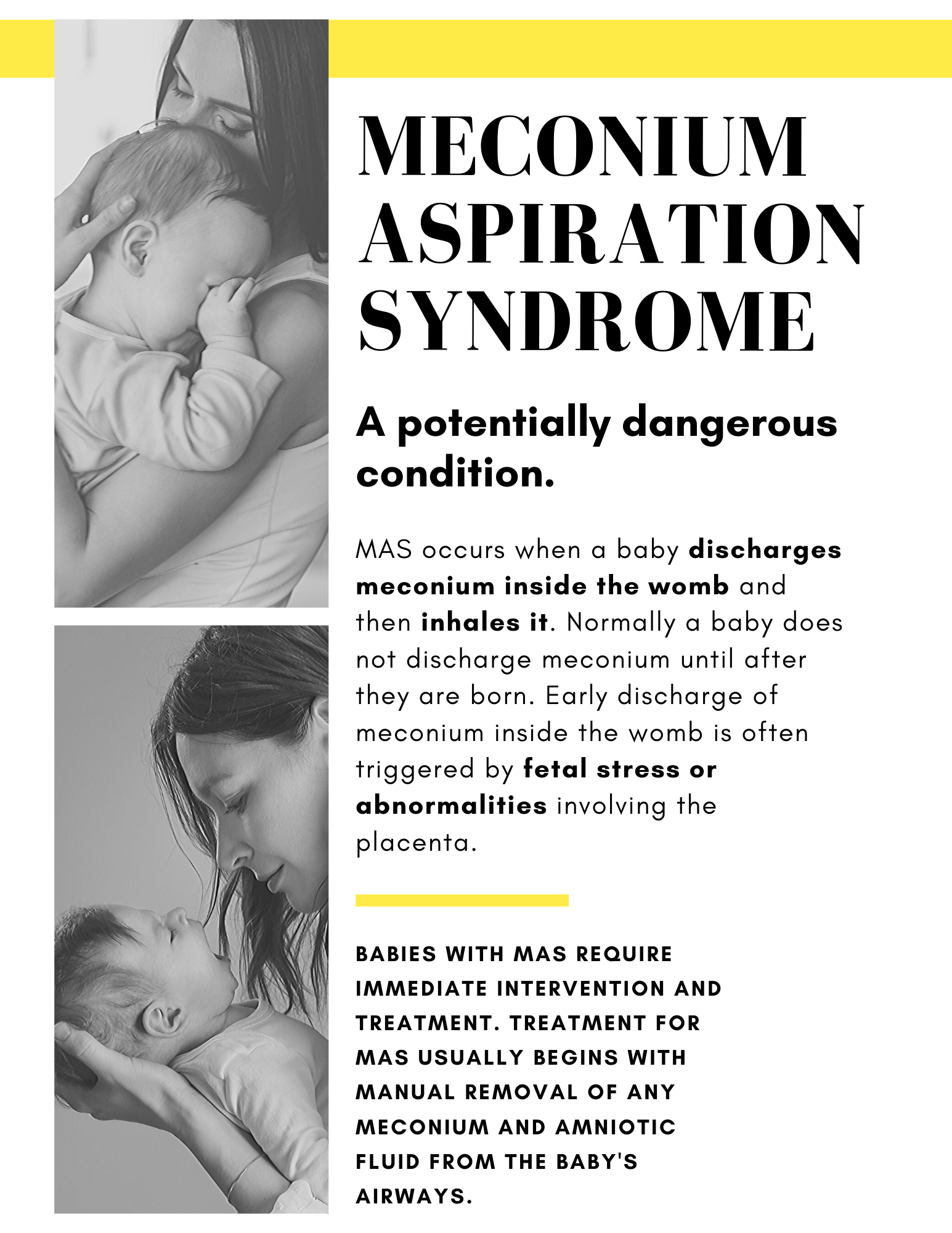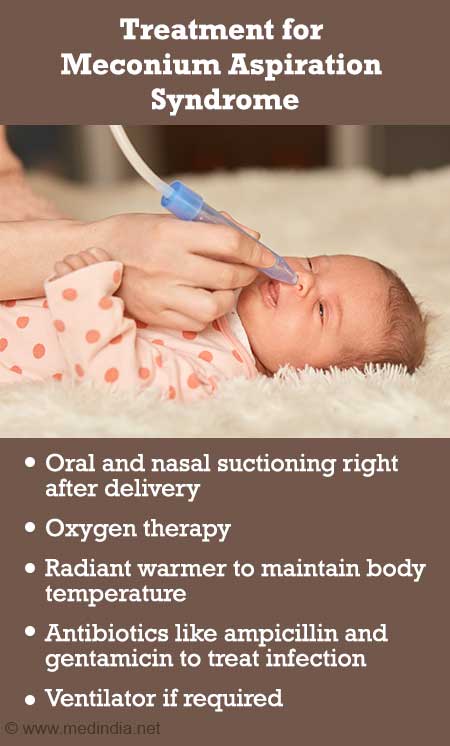Meconium aspiration syndrome a leading ca. Estimates suggest that historically around 10 of infants born in meconium stained amniotic fluid developed MAS.
9 an estimated 25000 to 30000 cases and 1000 deaths related to mas occur annually in the usa.

Meconium aspiration syndrome survival rate. Meconium aspiration syndrome induces. Meconium aspiration syndrome MAS is defined as respiratory distress in the newborn due to the presence of meconium in the trachea. Currently the mortality rate for infants with meconium aspiration syndrome is 12 in the United States.
Signs of meconium aspiration syndrome include tachypnea nasal flaring retractions cyanosis or desaturation rales rhonchi and greenish yellow staining of the umbilical cord nail beds or skin. Get A 100 Free CASE Evaluation. Neonates with air trapping may have a barrel.
Meconium aspiration syndrome occurs when a newborn breathes a mixture of meconium and amniotic fluid into the lungs around the time of delivery. Up to 10-15 of live births after 34 weeks can present with meconium stained fluid but only 1-5 of neonates develop meconium aspiration. Worldwide the incidence has declined in developed countries thanks to improved obstetric practices and perinatal care while challenges persist in developing countries.
1 mechanical obstruction of airways 2 chemical alveolitis and epithelial. In the non-ARDS group all 15 neonates 100 were cured. Depending on the length of exposure meconium skin staining may be present.
Even with elevated levels chances are your baby will be able to go home with you within a few weeks after delivery. If not detected and treated quickly MAS can potentially lead to serious medical conditions as well as permanent disorders such as. So it is recommended that babies born through meconium-stained liquor are observed for a period of time in all birth settings NICE Intrapartum care 2014.
Clinical presentation There is commonly a history of meconium stained fluid at birth. The ARDS group required a longer median duration of mechanical ventilation than the non-ARDS group 53 hours vs 3 hours P. What is meconium aspiration syndrome.
Meconium aspiration syndrome is a clinical condition characterized by respiratory failure occurring in neonates born through meconium-stained amniotic fluid. This need will often go away in 2 to 4 days. Neonates with severe MAS and ARDS tend to develop respiratory distress earlier require a.
Meconium Aspiration Prognosis. Meconium aspiration syndrome MAS is a condition that occurs when a newborn infant aspirates breathes in a mixture of meconium and amniotic fluid the fluid in which the baby floats inside the mother. The mortality for MAS resulting from severe parenchymal pulmonary disease and pulmonary hypertension is as high as 20.
Meconium is the earliest stool of a newborn. Aspiration of meconium into fetal airways can occur in utero or during delivery resulting in mas in 29 cases of msaf. Occasionally newborns pass meconium during labor or delivery resulting in a meconium-stained amniotic fluid MSAF.
Most babies with MAS get better within a few days or weeks depending on how much meconium they inhaled. Meconium aspiration syndrome MAS is the neonatal respiratory distress that occurs in a newborn in the context of MASF when respiratory symptoms cannot be attributed to another. However studies of babies that have severe meconium aspiration syndrome show a wide range of infant mortality rates anywhere between 5-40.
Respiratory support in meconium aspiration syndrome. 02 of total births develop meconium aspiration syndrome MAS. QUICK LINKS Pediatric Brain Injury.
However occasionally if the disorder is severe especially if it leads to persistent pulmonary hypertension of the newborn it can be fatal. A systematic review and meta-analysis Journal of Perinatology 2016 36 S48S53. Can Meconium Aspiration Syndrome Be Prevented.
The presence of meconium was associated with severe asphyxia and carried a bad prognosis with an increased risk of developing hypoxia 583 need of mechanical ventilatory support 431 respiratory andor metabolic acidosis 306 pulmonary ncbinlmnihgov. Other complications include air-leak syndromes eg pneumothorax. CK Natarajan et al Surfactant therapy and antibiotics in neonates with meconium aspiration syndrome.
In the ARDS group 43 neonates 96 were cured and 2 neonates 4 died. 10 a review of ten reports. 8 of these nearly half require mechanical ventilation 1520 develop air leaks and 512 die.
Meconium is a dark green fecal material produced in the intestines of a fetus before birth. Meconium is a newborn infants first bowel movement which is sticky thick and dark green and is typically. In most infants 80 the course of illness is short lasting 3 to 4 days after which they are discharged home.
Meconium staining may be visible in the oropharynx and on intubation in the larynx and trachea. Meconium aspiration syndrome MAS sometimes referred to as neonatal aspiration of meconium is a medical condition that affects newborns born with stool called meconium that has gotten into their lungs. It occurs exclusively in the immediate neonatal period.
Intrapartum and neonatal attributes. If a woman goes past her due date her doctor may recommend inducing labor to help prevent MAS. Meconium in the amniotic fluid is estimated to occur in 8-25 of all births at or after 34 weeks gestation.
There is no gender predilection. Generally the prognosis for babies who have aspirated meconium is good. Meconium aspiration syndrome is a respiratory disorder of the term and near-term newborns.
Most newborns with meconium aspiration syndrome have an excellent prognosis. Only about one half of babies with meconium-stained fluid will have breathing problems and only about 5 will have MAS. It is defined by inhalation of the meconium present in the amniotic fluid during or before delivery secondary to anoxic gasping in utero.
Rossi EM Philipson EH Williams TG et al. 4 8 Nine percent of patients are transferred to level III intensive care units. It is possible that symptoms associated with meconium aspiration will not appear immediately.
Newborns with meconium aspiration syndrome may be at greater risk of asthma later in life. In most cases of meconium-stained fluid the outlook is excellent and there are no long-term health effects. Babies may need extra support with breathing and nutrition in some cases.
Meconium is the first feces or stool of the newborn. Int J Pediatr 20122012965159.

Meconium Aspiration Syndrome Causes Symptoms Diagnosis Complications Treatment
Tidak ada komentar